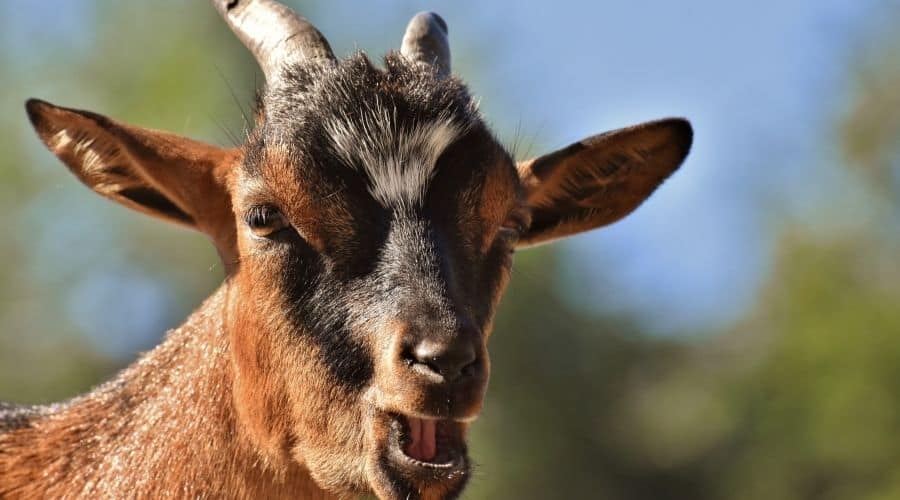Although donkeys are widely accepted as the best guard animals, goats make better alarms. They are used to warning other goats when there’s a problem by creating a tactful sneeze.
However, they’ll also bleat at almost anything or anyone that gets near your home as a way of warning you. Why do goats sneeze?
Goats sneeze to sound an alarm and warn other goats of danger without being obvious and tipping off other predators. Since goats tend to stick together, this common and intentional behavior is mutually beneficial. Goats will also sneeze due to irritation, allergies or illness and baby goats will sneeze as part of their play and learning.
Table of Contents
Why Do Goats Sneeze So Much
If your goats are sneezing all the time, you may want t see if they have allergies. Likewise, it’s a good idea to check the area for irritants and dust.
Since there are multiple reasons why your goats can sneeze so much, I’ve compiled a quick list of the most common reasons below to make it easier to figure out.
1 – Warning
Goats are surprisingly smart and social animals who live in herds of up to twenty. Without their fellow goats around, a lone animal can become depressed and lose its appetite.
Naturally, they feel protective toward one another, so they need a way to warn against danger.
A goat will make a sneeze sound to tell its herd-mates that it thinks there is perceived danger. Sometimes they will even sound a warning call when there wasn’t a real danger to be concerned about.
Regardless, the goats would rather ‘cry wolf’ than fail to tell their herd there’s a possible problem nearby.
2 – Dust & Irritants
The tickle you and I get in our sinuses if we wander into a dusty room isn’t unique to humans. Any creature with a nose and nerve endings can sneeze because of dust and irritants.
This is because most animals, especially mammals, have a trigeminal nerve that is sensitive to these minuscule stimuli.
According to HenryFord.com, “Sneezing is often triggered by an irritant to the nose,” says Dr. Yoo. “Your trigeminal nerve is a large nerve with branches to different parts of the face and irritation, from allergens, objects in the nose, boogers, and mucus, of this nerve in the nose, triggers the body to sneeze.”
Regrettably, if your goats are exposed to irritants over long periods, they can suffer trachea damage as well. This type of damage often causes sneezing and coughing.
3 – Allergies
Allergies aren’t reserved for humans either. Virtually any living animal can develop an allergy, though not all do.
Likewise, not all allergies cause sneezing, but many can. Typically if a goat has a pollen allergy, it will cause sneezing. That goes double for the spring and summer when more plants are in bloom.
4 – Hay
It goes without saying that goats have no hands. Unfortunately, you have one option when you lack sophisticated means to grasp and manipulate your food. Goats put their faces right into hay and grass.
Not only can a goat get a whole piece of hay up their nose, but they can also accidentally inhale a smaller piece or a few particles.
Hay is in the grass family and is made up of tough silica. Once dried, the hardy grass can easily poke soft inner-nose tissues causing the goat to sneeze.
5 – Illness
There are two ways that getting sick can cause your goats to sneeze. The first and most obvious is the direct route. Numerous illnesses cause sneezing, nasal discharge and other, similar symptoms.
The second way illness can cause goats to sneeze is from using balling or drenching guns incorrectly. These tools are meant to deliver medicine, but if they hit the wrong spot, you’ll have goat boogers all over you in no time.
Why Do Baby Goats Sneeze
Like their adult counterparts, baby goats tend to sneeze for a handful of pretty predictable reasons. These cute little creatures learn to behave like adults, and their bodies learn to respond to external stimuli.
Below are the top 3 reasons baby goats sneeze:
1 – Play & Learning
Baby predators play at attacking, tackling, biting, and clawing. This behavior is just part of how they learn to be successful adult predators.
Goats aren’t predatory, so their play is a little different. Instead of biting, goats butt heads in practice for future ‘battles’ to display their dominance and mate-worthiness.
Similarly, they learn to fake sneeze at one another in preparation for sharing the lookout duties.
2 – Allergies & Irritants
Like their adult counterparts, baby goats can end up with irritated or allergy-prone sinuses. The most significant difference is that, as babies, they are more susceptible.
As Healthline explains, “Sneezing is a mechanism your body uses to clear the nose. When foreign matter such as dirt, pollen, smoke, or dust enters the nostrils, the nose may become irritated or tickled. When this happens, your body does what it needs to do to clear the nose — it causes a sneeze.”
Like all animals with delicate tissues inside their nose, baby goats have to clear their noses as well.
3 – Warning Cries
Practice may make perfect, but goats and baby goats tend to alarm more often and easily than is strictly necessary. Some threats are more imaginary, while others are entirely real.
As babies, goats learn to sneeze-warn the group anytime they think there might be a problem. Doubtless, because of their inexperience and need to learn, the baby goats tend to sneeze more often.
There’s no need to worry over sneezy baby goats unless there are other symptoms. They are practicing.
What Does A Sneezing Baby Goat Look Like
Not all goat and baby goat sneezes have a complex social or physical reason behind them. Sometimes goats sneeze because they get a little tickle. The little goat in the video below is sneezing because a fly irritated its nose.
Helpful Tips To Know About Why Goats Sneeze
Having an itchy nose isn’t the only reason a goat will sneeze. More importantly, it’s not even the most urgent or interesting reason for the behavior. Luckily, with a little bit of observation, you should be able to spot the source easily.
Here are more helpful tips to know about why goats sneeze.
- Upper respiratory problems are common for goats and can lead to sneezing. It’s essential to identify the problem to treat sick goats accurately. To be sure, look for the other symptoms that come with respiratory issues like loss of appetite, fever, coughing, and nasal discharge.
- If you suspect your goals are sneezing more than usual or because they are ill, please consult with a veterinarian. A proper diagnosis can save your goats a lot of pain and suffering and help them heal quickly.
- Goats need essential minerals like copper. Without them, the goats will get sick much more easily and could even die. When you ensure your goats have proper nutrition, you will also cut down on ‘sick’ sneezing.
Final Thoughts
Whether it’s for play or as an alarm that warns others of danger, goats spend a surprising amount of time sneezing. As babies’ goats will incorporate fake sneezing into their play as practice for those adult warning calls.
Allergies, illness, and irritation are all incredibly common causes of non-warning goat sneezes. To tell the difference you should observe the goats in question throughout their usual daily routine.
Most goat keepers will be able to discover the root cause of the sneezing by merely watching their herd.


